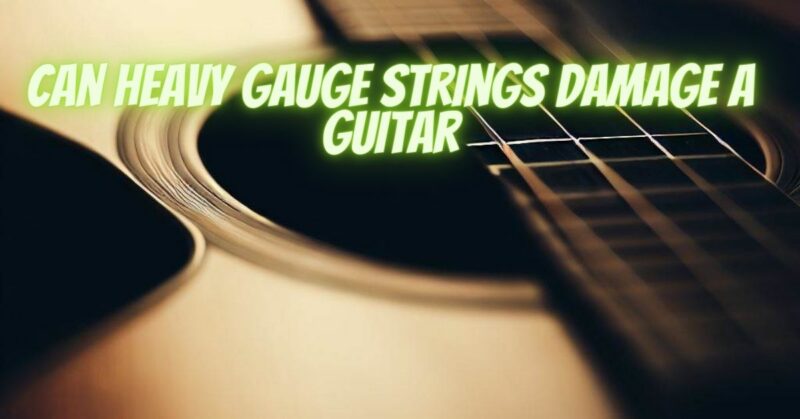The choice of guitar strings is a critical consideration for every guitarist, as it directly affects playability, tone, and even the instrument’s well-being. While heavy gauge strings offer a powerful and resonant sound, some players may wonder if using them can potentially harm their beloved guitar. In this article, we’ll explore the impact of heavy gauge strings on a guitar and whether they can cause damage.
Understanding String Gauge and Tension:
String gauge refers to the thickness of the individual strings in a set. Heavy gauge strings have larger diameters and higher tension compared to lighter gauge strings. When you tune a string to a specific pitch, its tension increases, pulling the neck and body of the guitar into a specific configuration.
The Effect of Tension on a Guitar:
Guitars are designed to withstand a certain amount of string tension without experiencing any damage. The construction and bracing of acoustic guitars, as well as the truss rod and neck reinforcement of electric guitars, are all carefully engineered to handle the tension exerted by standard gauge strings.
Can Heavy Gauge Strings Damage a Guitar?
In most cases, using heavy gauge strings within the recommended range for a particular guitar will not cause any damage. However, there are a few considerations to keep in mind:
- Adjusting the Setup: Heavy gauge strings put more tension on the neck and can cause the neck to bow excessively if not properly set up. If you switch to heavy gauge strings, it’s essential to have your guitar professionally set up or make necessary adjustments yourself. Adjusting the truss rod, bridge height, and intonation can ensure that the guitar can handle the increased tension without causing damage.
- Top Cracking on Acoustic Guitars: If you use excessively heavy strings on an acoustic guitar, particularly one with a delicate or thin top, the increased tension can lead to structural issues, including cracking of the top. To prevent this, choose a string gauge that is appropriate for the guitar’s design and construction.
- Nut and Bridge Slots: Heavy gauge strings are thicker, and their larger diameters might not fit properly in the nut and bridge slots designed for lighter gauge strings. This can lead to tuning problems and string binding. Properly filing the nut and bridge slots to accommodate the thicker strings can help avoid this issue.
Finding the Right Balance:
The choice of string gauge is a balance between achieving the desired tone and playability while ensuring that the guitar can handle the increased tension. For most guitars, a well-maintained and properly set up instrument can accommodate heavy gauge strings without causing damage.
It’s essential to consider your playing style, musical preferences, and the guitar’s construction when selecting string gauges. If you’re unsure, consulting with a professional guitar technician can help you determine the best string gauge for your specific instrument.
While heavy gauge strings can offer a powerful and resonant sound, their increased tension requires attention to the guitar’s setup and construction. Properly setting up the guitar and choosing a gauge that matches the instrument’s design will ensure harmonious synergy between your guitar and strings.
With the right combination of string gauge and guitar setup, you can achieve the tone and playability that inspire your musical creativity while safeguarding the well-being of your cherished instrument. Strike the perfect balance, and let your guitar sing with the resonance and power of heavy gauge strings, creating music that resonates with your heart and soul.


